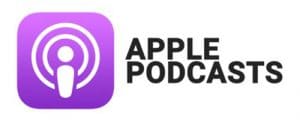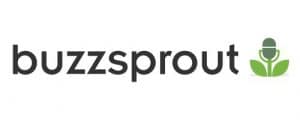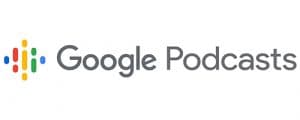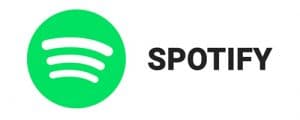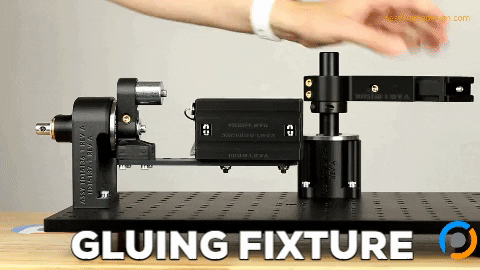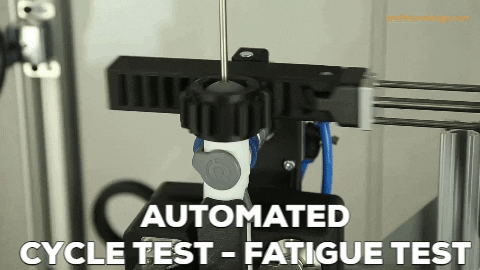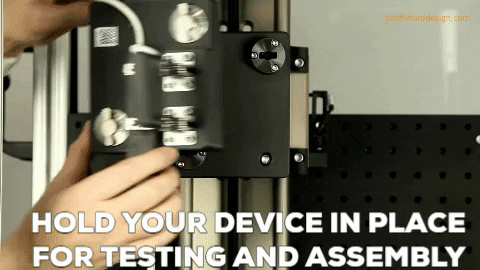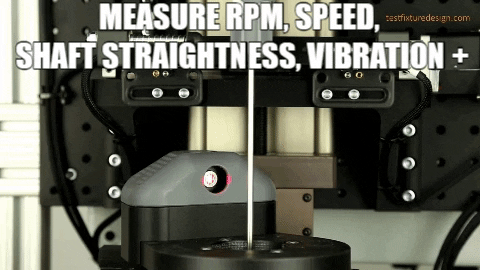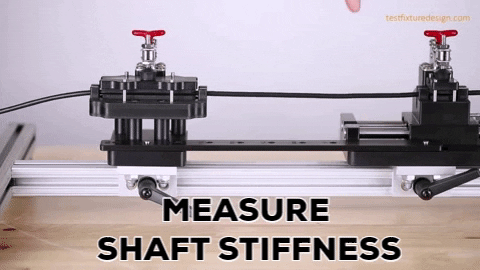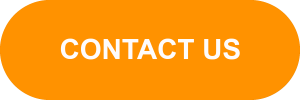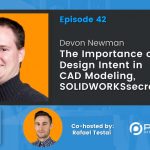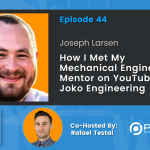Matthew Gaddy | Engineering Productivity
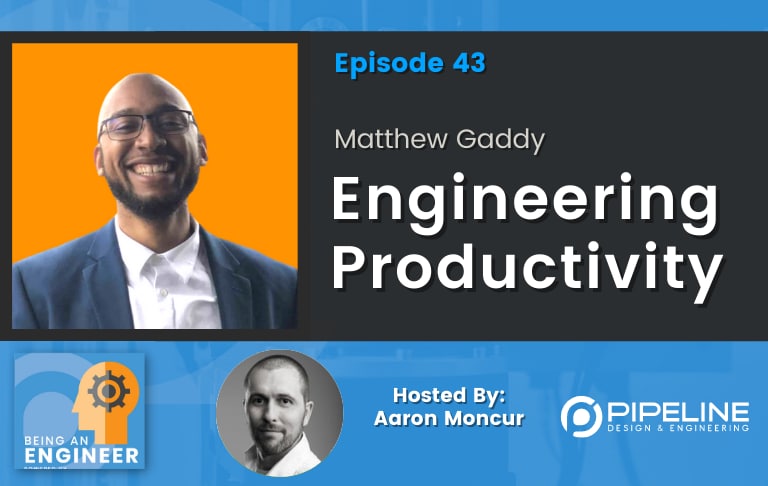
Who is Matthew Gaddy?
Matthew Gaddy is an engineer and a coach who helps other engineers leave 50+ hour work weeks behind by using their time more productively. It was clear during the interview that Matthew knows his stuff, from concise and poignant answers to sharing a few of the systems he uses himself and with his clients. Learn more about Matthew and enjoy all the free content he shared during this episode of the Being An Engineer podcast.
Learn more about Matthew:
EXPAND TO VIEW EPISODE TRANSCRIPTION
SUMMARY KEYWORDS
work, engineers, focus, productivity, goals, engineering, answer, hours, set, activity, find, days, task, email, called, matthew, coaching, speak, specialize, biggest
SPEAKERS
Aaron Moncur, Matthew Gaddy, Presenter
Presenter 00:00
The being an engineer podcast is a repository for industry knowledge and a tool through which engineers learn about and connect with relevant companies, technologies, people, resources and opportunities. Enjoy the show.
Matthew Gaddy 00:15
I’ll just say one of the biggest lies that I’ve ran into several times on engineering builders, that everything is important and everything is not important. There are certain tasks that are going to help you to reach your goals a lot faster than others. So your must dues are going to be those tasks that directly contribute to you completing the goals that you have set for yourself.
Aaron Moncur 00:46
Hello, and welcome to another episode of The being an engineer podcast. Our guest today is Matthew Gatti, who is an electrical engineer and the owner of Gaddy consulting LLC, where he is a coach focused on helping engineers work more productively, which is a topic I personally find fascinating and have thought a lot about over the years. So I’ve been very excited to talk with you on the show today. Welcome. Thank you for being with us.
Matthew Gaddy 01:13
Thank you so much for having me, Erin. And well, we’ve had a couple of scheduling snafu. So it’s great to finally get them and share with your listeners.
Aaron Moncur 01:20
Likewise, likewise. Okay. Speaking of our listeners, I want to share real quick here that this is episode number 100. Oh, so it’s kind of a milestone, right? Exactly. Big shout out to the rest of my team who helps us produce the podcast, there’s Raph and Nikki and Diane and Josh, all part of the team that produces the being an engineer podcast. So thank you for for all the hard work that they put into this. And big pat on all of our backs for episode number 100.
Matthew Gaddy 01:55
Yeah, congratulations to all of you.
Aaron Moncur 01:57
Thank you. Alright, so Matthew, what what made you decide to become an engineer?
Matthew Gaddy 02:03
Two reasons. One, my father is actually an electrical engineer. He’s been working with the Nuclear Regulatory Commission for almost 30 years now. So when I first was going into college, being exposed to someone who is an engineer understanding how that mechanic mindset works, it really opened my mind to what could I do? How can I approach different types of problems often, my dad’s real good problem solver. And when I saw that in him, he really inspired me to adopt that sort of mentality. When I first went to college, it was one of those things where engineering was the thing that really kept me out of trouble. It kept me busy enough, it kept me focused enough, it kept me in my studies enough to really say I have to devote X amount of hours each and every week, to make sure that I’m being successful and being studious, and learning all the subjects and being able to do well on tests do well on exams do well in just my college experience. So it really helped me to look at problems in a in a more engineering problem solving way and see how can we how can we analyze this and then also, it kept me busy. So that was one to two big things that really helped me to to choose engineering and also to stick in engineering as well.
Aaron Moncur 03:15
Awesome. I can definitely relate to the long hours, there wasn’t a whole lot of time for partying, no, not at all in school. All right. So how did you get into coaching engineers, and maybe, maybe you can spend, you know, 30 seconds or a minute or so talking about your engineering career and how you got to this point.
Matthew Gaddy 03:37
So initially, I had an internship at Encore electric delivery as a utilities company here in Texas. From there, it transitioned into my first job. And the reason will, being around engineers being in that particular environment, working in a meeting department and transitioning to standards, I was exposed to a lot of engineers who simply said, this will be a great thing to get done, but I don’t have the time to do it. And so there’s all these projects that can make our lives easier, all these projects, they can take this six hour process and knock it down to a one hour process, but we could not find the time to get done. So when I saw that gap inside of the market, I knew that I could find a way to serve that particular niche. Because of what I had learned in school looking going back to school, kind of referring back to what we talked about for the reason I got into productivity and just studying it and looking at it more in depth in the first place was that I wanted to figure out how can I optimize my study time? How can I make sure that when I’m studying, I’m not just here, sitting down for six hours doing nothing and just looking at a book or going through a chapter and then getting through and not remembering what I did I did something wrong. I didn’t figure it out. How can I really optimize my study time? How can I really make sure that I’m spending the time that I’m spending is being used effectively. So they got what got me into productivity space, and then when I saw that gap in the market, I really opened I say, Hey, I kind of figured it out. This is something that can help you all out as well. Because not only are you able to make sure that your daily activities are matching up with your goals, it helps you to make time for those projects that can really help you to shorten your work cycle a lot, because it doesn’t always it doesn’t only affect you, it affects the people around you, your department, your company, and then the world at large ultimately.
Aaron Moncur 05:23
Okay, excellent. This is a perfect segue into my next question. So we have been super, super busy at Pipeline lately, probably our busiest period, maybe ever. And to help us kind of stay focused in keep moving the ball forward in a meaningful way. I have introduced a theme to my team and the theme is, take a look at what you’re doing and decide is this a, a must do activity? Or is this a should do or a could do activity. And if it’s a should do or could do activity, either write it down and save it for later or just discard it entirely? And if it’s a must do then, of course, let’s let’s do it. One of my engineers. When I introduced this theme, he he asked a very poignant question. He said, How do we know if it’s a must do activity versus could do or should do activity? And I had my answer. But I’m, I’m curious to hear what you would how you would answer that question.
Matthew Gaddy 06:20
So when I’m thinking about the downswing, I must do a could do or should do task, it really comes down to your goals, looking at your goals and letting your goals determine what your actions should be, rather than just opening your your email and just saying I got all these emails, these all have to be done. Because one of the biggest, I’ll just say one of the biggest lies that I’ve ran into several times in the engineering field is that everything is important. And everything is not important. There’s certain tasks that are going to help you to reach your goals a lot faster than others. So your must dues are going to be those tasks that directly contribute to you completing the goals that you have set for yourself, or that your management has set for you. And that’s the way I would define it doesn’t lead to a goal must do it does not lead to a goal. And you probably let it wait for a little bit.
Aaron Moncur 07:06
Awesome answer. So that presupposes that we actually have goals right and written down. So yes. And I think ultimately, my answer is the same. What I said was take a look at the PRD the project or the project requirements document, does your activity directly help us move the needle in terms of achieving those requirements? If it’s yes, then it’s a must do If no, then it’s a condor should do. Let’s see you you teach this concept that focus is a muscle and, and that it can be trained. Can you talk a little bit about that specifically, what are what are some ways that we can strengthen that focus muscle in our brains? Okay.
Matthew Gaddy 07:50
So when we’re looking thinking about a our brains, when we think about our brains are actually a muscle? Well, how do you train a muscle the same way when you’re in a gym, if you want to get bigger biceps, guess what you have to train those biceps, properly, eat properly hydrate, and let them recover. Same basic principle applies when you’re thinking about your focus, you build your focus by focusing. So a great way to do this in an intentional way is through meditation, and also setting focus timers. Now when I say meditation, people’s alarms go off, and like what are you doing what’s going
Aaron Moncur 08:20
on. And it’s so kind of hippie nonsense, exactly. And a way
Matthew Gaddy 08:24
that you can look at it is just simply focused training. It’s literally sitting down setting a timer, 510 minutes, five minutes, 10 minutes, whatever you’re comfortable with, and just focusing on your breath. And literally, whenever your brain goes over here, and you remember, I’d take the dog out, or I need to cook this food, or my wife told me to get this thing, just bring your attention back to your breath. you’re training yourself to ignore those distractions and to concentrate on the task at hand. Another way to train your focus is to when you’re working, putting together a timer. But putting away all your distractions, if you have a 30 minute timer, putting away your phone, closing your email, browser, whatever it might be, and working on that one activity for 30 minutes at a time. Slowly, over time, you’ll be able to figure out, hey, I can get this 30 minutes pretty easily increase it to 45 to 50, increase it to 60 Increase it to whatever you feel as comfortable and that won’t overly impede the progress of the project you’re working on. And that slow and gradual progression will help you to build your focus over time simply by performing the activity that you’re trying to improve.
Aaron Moncur 09:26
I love that. And like any other muscle, the mind, I think can atrophy as well if we don’t focus its attention in that way. I started meditating a few years ago and I used an app called Headspace. I really liked it guided meditation. And I like the way you put it focused training right doesn’t quite sound as woowoo was rotation focused training. And I used it for maybe four or five months and kind of got to the point where I understood the process I understood how the guide was Shepherd me shepherding me through this process and And so I kind of stopped using the app. But I still do that basic process, which is I spent maybe about a minute just being aware of what my body is touching, you know, a minute, what is my back touching? Was my foot touching, what is my bum touching, spending just a minute being aware of that. And then I spend another minute, being aware of all the sounds around me. And it’s really interesting how many sounds you can pick out if you really concentrate on your environment, right? All the different sounds going on. And that I spend another minute doing kind of a scan from my head down to my toes. And this scan is just like a mental check in with different parts of my anatomy to see how they’re all feeling. And I found that to be a really great short little meditation or focus training that I could do. And I also found that when I stopped doing it, and then I started again, I did not have near the the focus that I had when I was doing it consistently. And that was that was very clear to me as I would kind of go in and out of these different periods. So. So along along a similar vein here, what are a few of the most common distractions that you see engineers encountering? And how do you help them defeat those distractions.
Matthew Gaddy 11:21
So the three biggest ones that I encountered frequently, our cell phones, email, and then other people when we were working in offices and work remotely. So the biggest one cell phone, we always have your cell phone on your cell phone is basically, I heard someone say, we’re basically androids now, because we have to have this piece of technology in order to function properly. That’s always with us. And I’m not going to be the person that says you have to get rid of your cell phone, you can’t use your cell phone, it makes you dumb, stupid, whatever. But we have to instrumentalize the times in our calendar, where we’re going to say this has to sit over here, we have to plug it into the wall, we have to put it away, we have to turn on silent, whatever it may be. Because it increases the chances that we get distracted. You don’t have control over when you get text messages. You don’t have control over when you get calls. But you do have control over if you’re going to respond to them. And also if you’re going to make yourself aware too, that text message or call being being come in. So my encouragement to the engineers listening to this, whenever you’re in your work period, set aside 3045 minutes of distraction free time, put your phone on airplane mode, I promise you 30 to 45 minutes will not kill you because you probably missed something for 30 to 45 minutes before and didn’t know it then the second one is email. There was a study done unbelievably by the University of London. And they found that when you have on your when you’re aware of unread email inside of your inbox, your IQ literally drops by five points. This is big. Yes. Because your brain begins to try to predict, well, it’s 2pm. What could that email be about? It could be from Sharon, because I was waiting on an email from Sharon lifts from Sharon, it’s probably about Project XYZ, she’s talking about X, Y, Z, we’re probably thinking about this. And your brain is doing all this processing in the background, when you’re supposed to be focusing on whatever you’re focusing on. Having unread email and being aware of it, it makes you dumber. So whenever you’re working, close your email, once again, 30 to 45 minutes will not kill you great way to make sure that it won’t kill you this, let other people know put it on your calendar, 45 minutes block it out. This is my time to work on XYZ project. The very last one is other people. If we’re always available, we’re never available. If I’m always having an open door policy and people can come in, well guess what, I’m never fully focused on the person that’s coming in. And I’m also never fully focused on what I’m working on. Because at any point I can be interrupted. So once again, setting aside time to say this is my dedicated time for me to work on this project. And then you can also set up some, like in college office hours, if you need to speak to me. Monday, Wednesday, Friday, from three to four, I’m wide open. And when you come in, I can devote all of my attention to you. I’m not going to be trying to listen to you and read this email or answer this phone call or work on this project. I am focused on whatever Aaron is saying, I’m all the way present. And that allows you to be more productive, it allows you to engage with your whoever you’re talking to you better and also makes them feel like they can you care about them because you’re not talking to him and checking my phone and doing everything else you
Aaron Moncur 14:16
love it. I love it. I fell victim to these distractions just a few weeks ago, I remember I had something blocked out on my calendar. So that was a good first step, you know, that I was supposed to accomplish. And during that time, I got a message from I can’t even remember who it was it was a direct message on teams or something. And I thought all this might be important. I’ll just respond to this real quickly. And so I did that. And then as I did that, I think I glanced at my email and I saw a couple of emails in there. Well, I’ll just I’ll respond to these right. And then And then someone called me and I was like go well this is an important customer I but I answered the phone and so I did and ended up being a half an hour compensation. All of a sudden, I had lost an hour and I did not accomplish what I set out to accomplish that morning, because I hadn’t shut down all those things, right? I think that we’re just not strong enough to avoid the temptation when we see little dings and notifications from, you know, a team’s message or an email or someone calling us. And so I’ve found myself anyway, I know, I’m not strong enough to overcome those temptations. If I don’t shut all those things down, chances are, I’m probably going to look at something. So if I, if I really need to get something done, I just have to shut it all down.
Matthew Gaddy 15:31
Yeah. So to two really quick things about that one, there was a study that I forgot who did it, I will find it for your listeners, there’s a study done. If on if you put yourself on six feet away, the chances that you actually go and get to it dropped by 80%. You put your phone one six feet away, because you have to get up and move and your body is lazy. And you’re just like, I’m not, it doesn’t exist anymore. The second thing is that you it means that technology is working, right? We have all these people that work on some of these neural triggers these neural pathways, these things that we really don’t even understand or have a Cognizant awareness of saying, hey, if I use this color, this color intrigues the human brain better than this one. So it’s not all your fault, it means that the system works, it means that the program works. So the best way to do it is just to avoid it altogether. That’s why putting it turning all your notifications off on your phone when you first get it. So you have to physically go check your phone, things like that can really help you to avoid that problem by never experiencing that problem in the first place.
Aaron Moncur 16:31
Great, great advice. And that will help you focus very deeply. Which leads me to my next question. Can you talk a little bit about deep work? What is deep work? And what it what why should we care about it.
Matthew Gaddy 16:42
So deep work is a term that was coined by Cal Newport and the overall concept of deep work is spending time spending enough time with a particular project in order to obtain a result that cannot be done in a distracted state, there are certain problems that you will not be able to find the solution to unless you can stick with that particular problem and be fully focused on it. And that’s where the real work lies. When we often what we often fall trap into is doing shallow work, it was the opposite of that, oh, I can answer this email, I can do this thing, oh, I can do whatever I have to do in a scattered brain state, it doesn’t take a lot of mental focus doesn’t really take a lot of mental energy, fortitude. But the real work, the real result comes from and we’re able to sit down with a problem able to stay with that particular problem, be able to be fully engrossed in that problem and work through that problem into a solution. And it’s not something that we can do. If we’re on our phone at the same time, it’s not something we can do, if we’re checking emails every five minutes while we’re doing it, it’s something that literally is going to require the best you have the best of you. And in order to get the best of you, you have to be in a state where your attention is not being pulled in one direction or another direction, it has to be all fully focused on whatever you’re working on. The perfect way to think it is that the level of your focus is directly proportional to the level of your potential you’re able to express in a task. So if you’re wanting to be able to perform better and whatever task you’re working on, the first thing you should do is figure out how can I increase my focus when I’m working on this military and Elon Musk, I’ll turn you into Steve Jobs will turn you into Jeff Bezos. But whatever your peak is, you’ll be able to reach it a whole lot better if you’re in a fully focused environment. And if you’re one where you’re trying to do 90 million things at one time,
Aaron Moncur 18:26
awesome. I agree with that as well. 100% I don’t spend a whole lot of time doing CAD design work myself these days, but every now then I will do that. And I definitely, I’m gonna toot my own horn just a little bit. I’m pretty quick when it comes to CAD design, even even after I have not done a whole lot of it the past few years. If I shut everything down and get get into my deep work groove, right, my flow, I can really knock out some CAD design pretty quickly. But if I keep my email open, and I’m checking this and I’m checking out I just I never get anywhere, anywhere close to the same level of productivity there. Sometimes, this is the case for our team right now for sure. And we all experienced periods when we’re just really really busy. There’s a lot to do more than usual. And in sometimes the the right answer is not necessarily certainly to spend more time working, but it’s to spend, spend your time getting better organized. Can Can you talk a little bit about how how have you helped engineers get better organized, so that they can accomplish you know, all this work that’s in front of them?
Matthew Gaddy 19:35
So it kind of goes back to our lives our initial question well, what is a must do and what is a could do and it shouldn’t really goes back to what are you actually trying to achieve? You want to figure out what are you actually trying to do you don’t go to work to answer emails you don’t go to work to answer phone calls. You don’t go to work, you just talk to people you go to work to do a thing. Now first thing we need to do is figure out what that thing is can we define that thing, okay, we’ve defined that thing. Now let’s break that thing down. Because we can’t, we don’t just go out and and accomplish a goal, we accomplish the steps that culminate in the accomplishment of that goal you can’t go out and work on, you need to finish this project. What does that mean? You have to break that down? Well, we need to get this design. First, we need to talk to this customer, we need to do XYZ things, when you’re able to take your goal able to break it down into action steps, it gives you a lot more clarity on what you should be doing. It also gives you a lot more clarity on what you shouldn’t be doing. Now, once you have those tentative steps planned out, when you’re able to say this is the rough framework, because we’re, if we could see into the future wouldn’t have this problem. Sometimes we can’t, there’s gonna be things that pop up. So if you ever attended a plan, it gives us a framework to operate from. And it gives us something to adapt rather than creating a new plan on the fly, because our initial idealistic plan got blown out the water because something happens. So it starts with figuring out what you’re trying to achieve. And then planning backwards from that, once you have your steps, you’re able to place each one of those steps onto your calendar, so that you’ve already created space for you to work on each individual task. Will this task extend beyond the time I had scheduled for it? Sometimes it will. But guess what, often more often than not, it’ll fit inside of that task, or excuse me inside of that time block. And if it doesn’t, if your time block was for 30 minutes, and it goes to 45? Well, guess what, if you didn’t have that 30 minute time block, you might have taken you an hour and a half to do. So it helps you to save time that way. So figure out what your goals are, break them down, place them on the calendar, and then execute on the powerful working in a distraction free environment, utilizing deep work principles so that you’re able to express your fullest potential and whatever task you’re working on.
Aaron Moncur 21:38
Amen, man, stuff, I love it. All right, well, I let’s see i i participated in, it was a year long coaching program. And this is more of a like a business coaching, not engineering coaching, called Strategic Coach. And one of the strategies that they taught us was, it was called the entrepreneurial time system. And it was composed of three, three types of days that they called Buffer days, focused days, and free days, and buffer days were the days where you just get you know, all the stuff done that has to be done, like every day type things, whether it’s answering emails, or it’s not really stuff that’s moving the needle is just the generic stuff that has to be done is is part of your role. And then there were the focus days, which were the days that you actually focus distraction free on the things that really do matter, you know, moving the needle, those are probably the your deep work days, like you were talking about. And then there were the free days where you do nothing. And really, they strongly advocate that you do nothing or no no work related activities anyway. Their argument was that these days, they don’t need to be in any particular order. Nor do they need to follow the typical five day workweek and two day weekend. Now, a lot of us work with companies that you kind of do need to follow that. So there might be a little bit of deviation between the entrepreneurial time system there and the type system that engineers need to follow. But you get the picture. It’s an interesting approach. And I really do like the concept of blocking off certain types of activities and working on them together. You you have your own system called the the time block, the time blocking system. Can you you know, without giving away all the secret sauce? It’s okay. Talk to us a little bit about that. What is the time blocking system.
Matthew Gaddy 23:38
So the time blocking system is a four step productivity system. It’s the one that I use is the one that teaches my clients. So the first step is identify. And this is where you’re going to identify the goals that you want to achieve what we talked about before, what are you really trying to do, you need to figure that out first, because without knowing that you’re just doing stuff, and you’d be working 10 years realize, oh, my gosh, I am not where I want to be. But I got all this stuff done. So we’re going to figure out what you’re trying to achieve, identify your goals first. Second things you want to do is select, you’re going to select the tasks that help you to achieve those goals. We don’t achieve goals just because we set it and we put it on our calendar and we read it every day we have to work towards and we have to do the things that lead to the culmination of that goal. So we want to select those particular tasks break that goal down so that we have an action steps that we need to follow. The third step is plan. We fail to plan we plan to fail. One of the biggest things that I see in engineers is that we are workplace calendars just have what meeting I’m supposed to be in. I need to go to this particular job site. But we haven’t designated time on our calendar for us to work on specific tasks. And when you’re able to do that, it creates a flywheel for you because you’re able to say we’re able to come in to work with a plan you’re able to know exactly what you’re working on and when you’re going to be working on it. And it gives you the confidence knowing at the end of your day that I move closer to the goals I’m trying to achieve today. And that gives you have the confidence to do the next day. And the last one is execute. We’ve talked about before executing on these goals, powerfully putting everything that you have in them, once you’re able to increase the quality with which you are producing it, and then also you’re able to increase the speed at which you produce it. If you want to produce things faster, and also produce them at a better quality we’ve been talking about for months, you increase your focus, to create these deep work times you need distractions wherever you can. So that’s the the time blocking system, identify, select, plan and execute.
Aaron Moncur 25:30
Nice. I had a comment, what was this? What was it? It’ll come back to me? Well, in the meantime, let me share that team. pipeline.us is where you can learn more about how we help medical device and other product engineering or manufacturing teams develop turnkey equipment, custom fixtures and automated machines to characterize, inspect, assemble, manufacture and perform verification testing on your devices. We’re speaking with Matthew Gaddy owner and operator at Gaddy consulting LLC, where he helps engineers leave 50 plus hour work weeks behind by using their time more productively. So Matthew communication is a topic that comes up frequently on our podcast. So let’s talk about how engineering teams communicate for a few minutes. You’ve kind of touched on this already. But you made an interesting statement in one of your LinkedIn posts where you said perpetual availability is a productivity problem. How should individual team members make themselves available for collaboration with with other team members, but you know, also isolate themselves from from the noise so that they can focus? They’re almost to like competing requirements? They’re
Matthew Gaddy 26:47
yes, they’re definitely on opposite ends of the spectrum. And the best way to do that is I hate to use this word, but communicate with your team and figuring out hey, what day is good for you? Am I able to if we designate Thursday as the day we’re going to meet? Can we all just say, can we just make Thursday, today we meet Okay, now let’s find a time that all of us are available, can we find a time we’ll find a time for all those are available, we will be able to say this is our definitely collaboration time, we’re able to put that time on our calendar and say collaboration exists within this pocket of time. It allows us to have the freedom to collaborate wholly in whatever we’re doing, we’re all on the same page. Once again, in the same example that I brought up before, if you’re always available in your in your collaborating stage, you might be collaborating, but you also might be trying to work on your stuff. Why? Because you haven’t set aside time to work on your stuff. So when you set aside time for collaboration, you set aside time to work on your physical activities that allows you to be fully present and fully productive, and just bring your best self into both environments. So it really comes into figuring talking with your team and letting your team know, this is when we’re going to be collaborating and also letting them know when you’re going to be unavailable. That’s the best way to do it. Because now you guys can even do trade offs. If there is an inbox that you guys need to watch, in order to get information back from a customer or you’re waiting on some specs from a manufacturer, but you don’t know when it’s gonna come in. But whenever it comes in, we need to act on it immediately. Well, if I know that Aaron is unavailable, between three and four, I can be on inbox from three to four. And then when it’s errands, on errands, focus time is up, I can hop into my focus time and errand man the inbox. So just having that level of collaboration and talking with your team, and communicating with them allows you all to work in a cohesive work environment where you’re able to collaborate effectively, but also focus effectively as well.
Aaron Moncur 28:42
So speaking of technology, and communication, we use a project management tool called called write W R I K E, which I love with all my heart, it’s one of my favorite tools. And we can message each other back and forth on that platform, which which ends up being very task specific, which is usually a good thing. But we also use Microsoft Teams. And that ends up being a little bit more of a general communication tool. Then of course there’s there’s email, how should we be utilizing technology to communicate with each other, especially now that work environments have become much more remote and more virtual than they have been in the past?
Matthew Gaddy 29:25
The way that I would encourage you all to look at your messaging, especially messaging and a direct message since as well would be to whenever you’re able, getting ready to ask a question before you ask the question. And really think about it first. A lot of times we ask other people questions simply because it’s more convenient, a lot easier for us to ask you the question than for me to struggle with it for five minutes and figure it out. And that’s just human nature. It’s not just what it is. So whenever you’re typing a message whenever you’re getting ready to send that team’s message, stop for a second really thinking about, okay, how can if this person does not exist, and this person is not going to respond to me? If I knew the answer to this, what could it possibly be? And just by asking yourself that question, it opens the door and removes some of the judgment that we have on ourselves of getting the wrong answer and allows us to really just brainstorm and freestyle. Well, it could be this, it could be this, it could be this, well, then guess what, you got three options together. Now, when you send that message, you can take those three options and just saying, instead of me asking Aaron, Hey, Aaron, how should we do this? I can say, Hey, Aaron, I was looking at this problem, I’ve got three things, which one of these is closest to what I’m supposed to do? That puts you in a good light, too, because now you’re presenting options where I can correct and it really shows me like, hey, he thought about this first, he didn’t just come blindly ask me. And I’m able enables you to train your mind to think about the problem in different ways, and also allows you to think without having a judgment on yourself. If I don’t want to get this wrong, it’s brainstorming. What could the answer be? If I knew the answer, where should I start looking for, I really helps a lot of you.
Aaron Moncur 31:07
That’s a great way to think about it never filled out a form online, like a vendor asks you for feedback, or some kind of rating or something. And sometimes they have a scale like a one to 10. And all you have to do is click, and other times they have a blank field where they say, please type in, you know what your thoughts are, I’m always way more likely to just click on the box than I am to actually spend the time typing something out exactly the same idea, right? If you can be thoughtful enough to think about a few answers beforehand and send them as options, then, whoever you’re communicating with is probably going to be a lot more, at least is going to appreciate more, because they don’t have to think as much now. Select an option.
Matthew Gaddy 31:48
Exactly. And helps you learn the process too. Because you can say, Hey, I saw where you were going with this. Let’s correct this particular thought process. You started good on this one. But this is where you messed up. And it’s a learning exercise rather than just getting the answer. Yep.
Aaron Moncur 31:59
Oh, and I have a pet peeve that I’ll share here. This is specific to direct messaging, I guess texting, it could fall under that category as well. But it drives me crazy. When people when people send like, five different messages, incredible, one message. The right you know, 10 words, and they’ll hit send, and they’ll they’ll write 10 more words, and they’ll hit send, it’s like ding, ding, ding, ding, ding, just write it all out of what’s crazy.
Matthew Gaddy 32:33
And that can go into kind of segwaying into what we’re talking about in more productivity aspects, setting expectations. When we set expectations for people, they know that, hey, Aaron likes and all at one time, it doesn’t like five different things at one time. It also can go to your vendors, if you set aside focus time, or kind of playing on the entrepreneurial productivity you’re talking about before we’re having your focus days. If you have regular focus days, and you’re interacting with customers, letting them know in advance, hey, I don’t answer emails on Thursday. So when your answered email doesn’t get answered on Thursday, it’s not oh my gosh, he’s annoying. He’s not listening. It’s like, No, he doesn’t answer emails on Thursday. I’ll get the answer on Friday. So we set those expectations in advance that allows us to be our most productive selves as well without knowing people or making it feel awkward.
Aaron Moncur 33:22
I think setting expectations is a big point. The last guest I had on the show, Joel Williams, share this really cool tool with me. And it’s called the the self User Guide. And he wrote and this was he, you know, freely shared that this was something he had learned from some someone else as well. But it’s it’s, you know, I don’t know, three to six page document that talks about this is how I prefer people work with me, not necessarily that everyone is going to work that way with you. But at least you’ve set expectations, right? So I have a user guide for Aaron, I talk about, this is what time I usually go to bed. This is what time I usually wake up. This is what time I usually start work. These are the times when my phone is just off, so you’re not going to get a hold of me. And it’s setting expectations. I think it’s such a wonderful tool, I hope I hope some people on my team take me up on my offer and and write their own and share it with me and others on the team because it’s a great way to communicate with other
Matthew Gaddy 34:24
people. I’m going to make that note I have the right mind right after this.
Aaron Moncur 34:28
Awesome. Yeah. All right. Let’s see. I had a particularly grueling week, a few weeks back, I put in almost 80 hours which which is very much not common for me. But that week I just It couldn’t be avoided. And this is after I had discarded all the could do and the should do activities. At the end of the week. I was definitely tired, but I’d also accomplished all the things that that I needed to and so that was a really good feeling. I think sometimes we hold up these long hours as like badges of honor among our peers, even though 80 hours is well beyond the norm for me, I probably routinely do 50 plus hour weeks. And I’m wondering what your opinion is on this is, is that bad? Am I Am I hurting my own productivity by working that much?
Matthew Gaddy 35:20
That is not a simple question to ask, the way that I would go about determining that would be not even what your results were of that week, but What activities did you actually do, because we might spend the first half of our days being extra productive and working on our must haves. But then the next four hours, eight hours, whatever it may be, we might just be goofing around, and that ends up acting, adding up to nothing, you were goofing around, but that might end up being 50 6070 hours. But you really only did 20 hours of actual productive time. So I think when we’re looking at trying to evaluate how long we should be working, I think that looking at it in a time based concept is something that is detrimental to our productivity, actually, because this was something that I ran into, and then I’ll promise I’ll bring it back around something that I ran into when I was in the engineering space. Well, we had in our work days, well, if I have to be here for eight hours, what is my incentive to be productive? If I can get it done? And because I have to be here, because then it’s like, okay, I started to fill four hours of space. And this is the only project I’m working on, I finished everything else. Why would I get this game productive now? So really looking at what were you actually doing the most 8080 hours or 50 hours, 60 hours, whatever it may be determined, were all 60 of those hours. Productive actions, because generally, without looking at your schedule, majority of them may not be they may be they may not be. So instead of looking at the time aspect of it, we have to look at the results. Results aspect of it are the activities that I’m working on going to lead to the goals I have to set for myself, are these going to accomplish the tasks that I’m trying to achieve? Rather than looking at I spent 50 hours doing it, 60 hours doing this? Because you could spend 60 hours doing, you know, playing video games that work? But yeah, right doesn’t mean anything. Yeah.
Aaron Moncur 37:22
Great way to think about it. Let’s talk a little bit about about your work and how you work with engineers. Why do you find engineers typically connect with you? You know, what, what are some of the reasons that if listeners are thinking to themselves right now, they should consider giving you a buzz?
Matthew Gaddy 37:41
Because I understand I was in the industry for awhile, almost eight years. So a lot of the growing pains or the different ways of operating I’ve been exposed to. So when someone says, oh, we work 60 hours this week, that’s not something super foreign to me, where I’m like, Oh, my gosh, did y’all get overtime? It’s like, No, we had to finish it out. So being able to speak that engineer language, but also being someone who is able to speak a fresh outlook on a physician, I’m not going to be cut in, I’m not going to be dry with you, I’m not going to be monotone. It’s like, hey, is this what you chose to do? Let’s find something in what you’re doing to get excited about. Because if you can’t get excited about anything you’re doing, then maybe you need to talk to one of my friends, Jeff, who’s a career coach, because it’s gonna be really difficult for you to be productive in a job that you hate. Or you’re gonna have to spend a lot more energy to be productive in a job that you hate. And rather, you might be able to get something done in two hours is going to take you four hours, just because the entire time working, I hate this thing. And I don’t like it. So being able to speak the engineer language, also being able to be on the outside looking at helping to give them perspective and just say, Hey, you may feel like you’re overwhelmed right? Now, you may feel like you’ve got all this on your shoulders, you might feel like you don’t know what to do, like you can’t breathe. But I’m here to let you know that I’m looking at it from the outside in, I sees a plan that we can follow. I follow this framework, I’ll walk you through it. It’ll help you to handle this and be able to accomplish a task to set for yourself. And ultimately, I want you to do this for yourself. My job is to help people not need me anymore. I want to coach myself out of a job. When you leave working with me. I don’t I want to see you again. Because like, everybody I’ve worked with is cool. And I do like and join, do enjoy speaking with them. But hey, the things we’ve talked about, I want you to be able to do this for yourself. I want you to be able to do this for other people as well. Would you be able to sit down with your team and say, This is what I learned from Matthew, this is how you can apply it in your life so that you can be the productivity leader at your flight at your place of work. So that’s my ultimate goal. And that’s what I think really sets me apart from everyone else.
Aaron Moncur 39:48
Wonderful, wonderful. Write this next question. I’m not sure it’s directly related to what you do, but I think it’s at least tangentially related. I’d like to hear your opinion on on it. In a sales context, I have I have found that if I focus my efforts on a small group of companies or individuals sustained over time, I’m a lot more effective than if I focus my energies on a large number of groups or individuals that are relatively short lived efforts. And I’m wondering if there is a corollary to engineering specializations? And in other words, do you think that we, as engineers, should be focusing our efforts on like, becoming specialized within our engineering industry, as opposed to trying to be the kind of jack of all trades or Renaissance men of engineering, or women, of course,
Matthew Gaddy 40:51
I think, once again, it goes back to what you want to do. If you want to be in a director, CEO level role. It would help for you to specialize, that maybe not specialized in the same manner as a subject matter expert in that particular activity. But you do need to have enough information for you to ask what I call intelligent questions. Can I ask an intelligent question about what’s going on here? Am I able to quickly learn this particular this particular information and apply it and see how this relates to something else? Now, if you want to go into subject matter expert world, specialized, specialized specialize, and then go to something that’s tangential to that and specialize in that as well. And then that’s where the innovation comes in, you’re able to specialize in, I don’t know, computer programming, and then also in some other facet of engineering, we were able to find that, oh, this interacts with this. And the only reason I can do it is because I’m the only one that specialized in this and in this allows you to have those innovative insights. So, too, I hate to be this guy. But it really does depend on what you want to do. And I don’t I know, I know, I know, that’s not the answer. But it really does depend on what you want to do. So I wouldn’t say that it is bad for you to specialize. I wouldn’t say it’s bad for you not to specialize, but you need to be make those decisions on purpose rather than just being in that particular decision. So figure out what you want to do. First,
Aaron Moncur 42:18
it comes back to being intentional, exactly what’s your what’s your goal, decide what your goal is, and then figure out the best way to get there. Exactly. If there was one thing that you could paint on a billboard as advice, or a best practice that was going to be seen by millions of engineers, what would that thing be?
Matthew Gaddy 42:38
Probably would be slow down, that that focus slowed down that that that focus, we move much too fast, a lot of the time, and we feel that moving fast is always synonymous with being productive. And sometimes the most productive thing for us to do is to either move slow, or sometimes not even move at all, that meditation comes in, sometimes the best thing for you to do is sit, rest, relax your mind, bring yourself back into the present, and then work on something rather than just going from here to here to here to here to here. Movement doesn’t equal productivity. Yeah,
Aaron Moncur 43:14
yeah. Or engineering manager likes to say the best way to get something done quickly
Matthew Gaddy 43:19
is to do it slowly. Exactly. Exactly. Yeah.
Aaron Moncur 43:22
All right. Well, let’s see Matthew, what, for those people out there who are listening to this episode, and thinking to themselves, Man, this guy, Matthew, He knows what he’s talking about. I need to talk with him and get some help them my productivity, what’s the best way to to get in touch with you,
Matthew Gaddy 43:41
the best way to get in touch with me is through my website is just my name. Matthew gaddy.com, ma, TT H Ew, G as in go a D as in dog, D as in dog, y.com, you can sign up for my email lists there, you’ll get a weekly productivity newsletter, and I’ll also be able to connect with you there. And I’d love to speak with anyone who is struggling with productivity, and not even going to try and sell you anything. I’m here to help more people than anything else. So if you have any questions, if you have any things versus like, Hey, I call them Am I crazy checks? This is what I was doing. This is what I did. Am I crazy? Am I not crazy? Does it make sense? What’s going on? So I love being able to do this for people and being able to support you in your productivity and waterboy? I can.
Aaron Moncur 44:24
You know, something I’ve learned from working with a lot of coaches over the year is that people who are in a coaching role, they they seem to genuinely want to help people. I mean, that’s why they’re doing what they’re doing. So when you say you’re not not even going to try and sell them anything, I think you’re probably being very sincere about that. And you probably really just enjoy even if it’s just, you know, half an hour conversation to see if it’s a good fit, how can you help? I think that’s probably something that you really enjoy, and I hope people take you
Matthew Gaddy 44:54
up on it. I’m a productivity nerds. You’ve given me an opportunity to talk about stuff that I find interesting. So thank you for allowing me to talk to you about what I care about.
Aaron Moncur 45:05
Excellent. Excellent. All right. Well, Matthew, is there anything else that we should have talked about that we haven’t hit on yet?
Matthew Gaddy 45:11
Um, I would just as a reminder to everyone listening to this, this podcast, we’ve talked, I’ve hit harped on goals a lot. And I want to continue to harp on goals. Remember what you’re working towards. It’s basically like a beacon for your activity. Whatever your goals are, what if they’re your personal goals, your department goals, find somewhere where you can see them at your workplace funds, wherever you can see them when you sit down work at your computer, and really begin to analyze and cross reference and say, well, this thing I’m working on right now help me achieve those things that are written down on a sheet of paper write their answer is yes. Do it do with gusto. Do it to the best of your ability? If the answer is no, find some time in your calendar to do it later and find activity that will.
Aaron Moncur 45:59
I think that is deceptively simple and powerful advice. Thank you for that. Thank you. Alright, Matthew. Well, thanks so much for hanging out today. It’s been just a delightful conversation. And I really, really appreciate it.
Matthew Gaddy 46:13
I appreciate you. Thank you so much for having me on. And I look forward to speaking to you more soon.
Aaron Moncur 46:22
I’m Aaron Moncur, founder of pipeline design and engineering. If you liked what you heard today, please share the episode. To learn how your team can leverage our team’s expertise developing turnkey equipment, custom fixtures and automated machines and with product design, visit us at Team pipeline.us. Thanks for listening
We hope you enjoyed this episode of the Being an Engineer Podcast.
Help us rank as the #1 engineering podcast on Apple and Spotify by leaving a review for us.
You can find us under the category: mechanical engineering podcast on Apple Podcasts.
Being an Engineer podcast is a go-to resource and podcast for engineering students on Spotify, too.
Aaron Moncur and Rafael Testai love hearing from their listeners, so feel free to email us, connect on Facebook, Twitter, Instagram, and subscribe on Apple Podcast and Spotify!
About Being An Engineer
The Being An Engineer podcast is brought to you by Pipeline Design & Engineering. Pipeline partners with medical & other device engineering teams who need turnkey equipment such as cycle test machines, custom test fixtures, automation equipment, assembly jigs, inspection stations and more. You can find us on the web at www.teampipeline.us.
***
You’ve read this far! Therefore, it’s time to turn your headphones up and listen now to this episode to learn all these. Don’t forget to tell your friends who might like this too!

